Contents
- I knew nothing about Ugandan food until I stayed with a local family there.
- Cooking Ugandan Food
- Preparing the food
- You need to know about matoke!
- Eating Ugandan food in the home and cultural differences
- One interesting thing about chicken in Uganda
- How meat is different in Ugandan food (and regional East African food):
- Eating with our hands!
- Alcohol in Uganda
- Eating and cooking Ugandan food with a local family was overall really humbling.
- I am so thankful for my experience in Uganda!
I knew nothing about Ugandan food until I stayed with a local family there.
They proceeded to stuff me with food until I felt so full that I was actually worried I would explode!
The family was from the Baganda tribe, and so some of my experiences with them may be unique to that tribe. You can see a list and read more about the different tribes in Uganda here.
Ugandan food is tasty and filling, and I hope this little post helps you know what to expect when you travel to Uganda. Get ready for carbohydrates!
I loved the food, and the culture around eating and cooking was very different from what I was used to! It was so wonderful to be able to spend time with a family and learn about their lives in that way.
Cooking Ugandan Food
The women of the family spent a lot of time in the garden cooking food. They had a kitchen in their house, but they told me they preferred to cook outside with a fire.
They also did most of their cooking on the ground and would bend over to stir stuff or do whatever. As someone who had back surgery, I was so intrigued by this posture!
They have way better bending posture than I do, bending directly at the hip instead of using their upper back. Sorry that’s a random detail and not really related to Ugandan food, but I’m really sensitive to posture!
They refused to let me help with anything at first, but by the end of my stay, I was out there helping them chop and peel and cook everything.
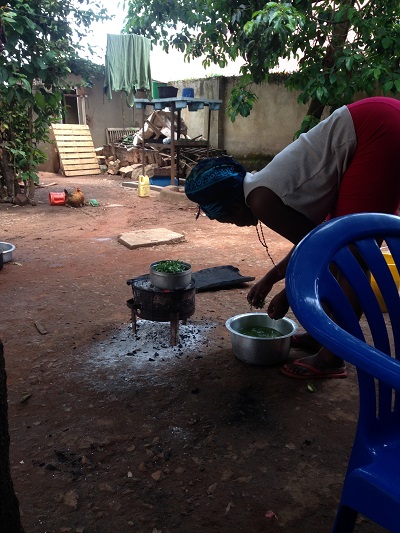
Not fast food…
One small cultural difference is that cooking Ugandan food took a loooooong time. The meat was grilled fully and then seemingly grilled again. Then it was boiled with vegetables for what seemed to be hours…or maybe I was just hungry and it felt like it took hours!
I mean, it also takes forever to make some French food, and so maybe I was the weird one as an American who wants my food instantly.
Perhaps they cook it for a long time for hygienic reasons, or maybe it was just to bring out all the flavor.
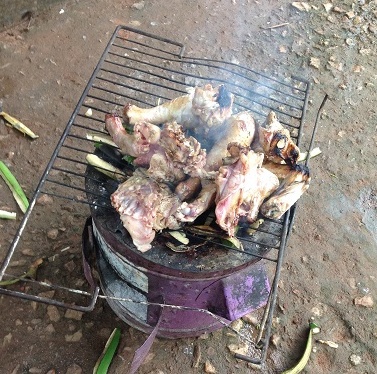
Preparing the food
We washed the greens, potatoes, and peppers over and over to make sure they were perfectly clean.
Apparently someone told them that as a Muzungu (clueless white person), I wouldn’t enjoy watching a chicken being butchered, so they did that before I arrived.
As much as I think it is important to see where our food comes from (especially because in the USA we can live our chicken nugget-filled lives without ever actually seeing a chicken be butchered), I appreciate them not making me kill the chicken.
Maybe next time…
Then they set me to work peeling cassavas, yams, and potatoes. I’m sort of awful at that…
I never peel my own potatoes at home since I’m such a lazy cook. I think they were just giving me a job to make me feel like I was helping. Dumb Muzungu…
The staple food in Uganda is matoke. Imagine mashed potatoes but instead of potatoes it is made with bananas.
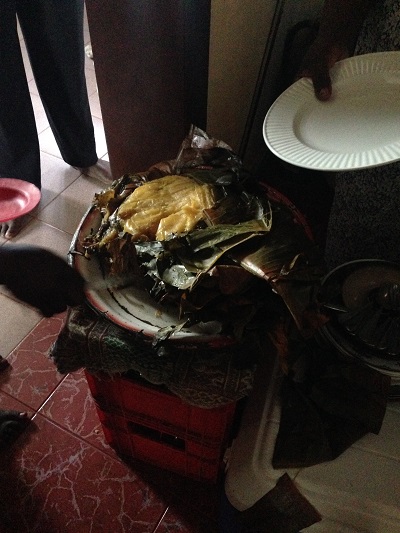

Going to Uganda and not eating matoke is sort of like going to France and not eating a croissant.
It is the staple Ugandan food and you will have plenty of opportunities to eat it, especially if you are hanging out with Ugandans.
To make matoke, they take green bananas (not the sweet kinds we typically have in the West) and they peel them and steam them.
They often steam them in the big, broad banana tree leaves.
When you open the leaves you get a mini facial of banana steam and then the house smells great.
The matoke turns yellow during the steaming process.
How does matoke taste?
Super starchy! There is a slight banana taste but it definitely isn’t a sweet food. It is ultra filling.
Like, after eating a serving of matoke you are all set for the next three days.
I liked it, though, but I really couldn’t finish the enormous portions they kept giving me! It’s definitely heavier than mashed potatoes. Plus, they do eat a variety of potatoes in Uganda so you may be eating your matoke with a side of potatoes. And then add some cassava and rice…
I hope you love carbs!
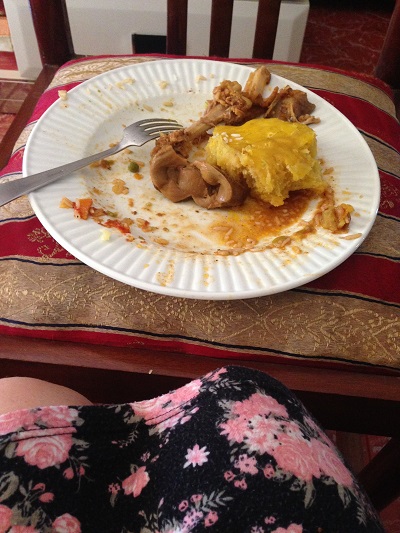

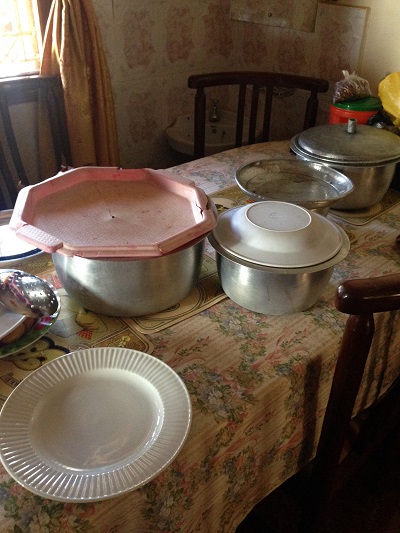

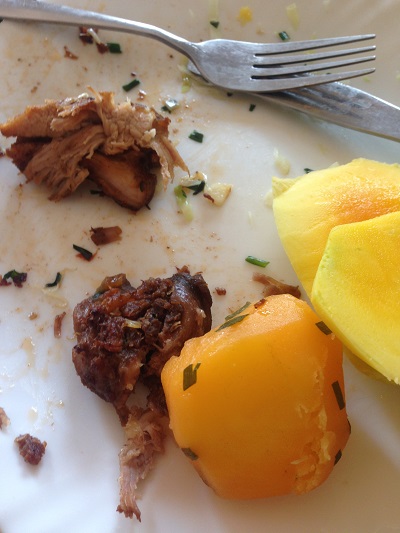

Eating Ugandan food in the home and cultural differences
With the family, I had a few meals of chicken and vegetable stew, matoke, potatoes, rice, avocado, peppers, and stewed kale. We washed it down with some absolutely fantastic fresh passion fruit juice.
In another home, I had more potatoes, steamed cabbage, and pieces of grilled pork.
There were always plenty of fresh papayas, passion fruit, and mangoes.
And the tea was always filled with spices and sugar! Yum!
The snacks included peanuts (groundnuts), and these roasted corn kernels that were just soooo tasty. I even brought a bag of them back to France with me!
You will also have some of the best peanut butter you will ever taste in Uganda. They thought I was a weirdo for putting peanut butter on a banana and having it for breakfast.
One Ugandan friend had spent some time in the United States and so he was familiar with the differences in eating habits and customs. Thank goodness for him! He explained so much to me.


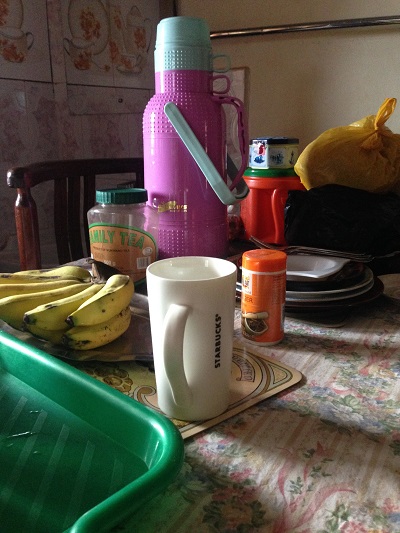

One interesting thing about chicken in Uganda
So in the USA, chicken has basically become our bland, basic, somewhat ubiquitous meat. It is also one of the cheapest meats we can buy.
My hosts gave me chicken over and over. It was great, but I was wondering why they decided to do this specific recipe several times.
Well, one thing they told me is that they usually stick to one way of preparation for a lot of their meats. Chicken means this chicken stew. Fish is always prepared in its own way. The same holds for beef, etc.
Also, I learned that chicken is the most expensive meat for them. They were truly honoring me as their guest. The equivalent would be cooking filet mignon every night for them at my house in the USA!
Even eating meat on a daily basis is not so common in the home, since it can become expensive.
I felt so flattered by their generosity.
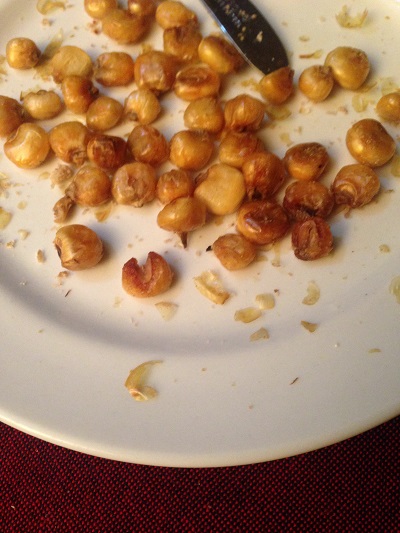

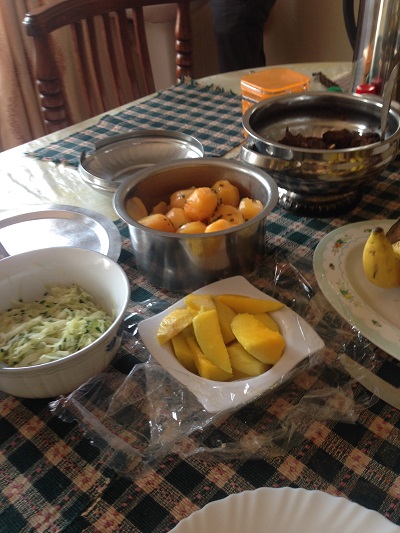

How meat is different in Ugandan food (and regional East African food):
The meats were not supersized or pumped up with whatever. The chicken and pork I had were tougher and more sinewy. It held the same for the meat in Kenya as well.
It is probably a matter of that being just the way these meats are naturally supposed to be like.
But, especially in Nairobi, when I spoke to people who had traveled to Europe or North America they all mentioned that they thought our meaty chicken was a bit weird and preferred the leaner kind they get back at home.
Also, I am in awe at how well they could pick those bones clean! I felt embarrassed because what I thought was a finished chicken leg still had plenty of meat on it to them.
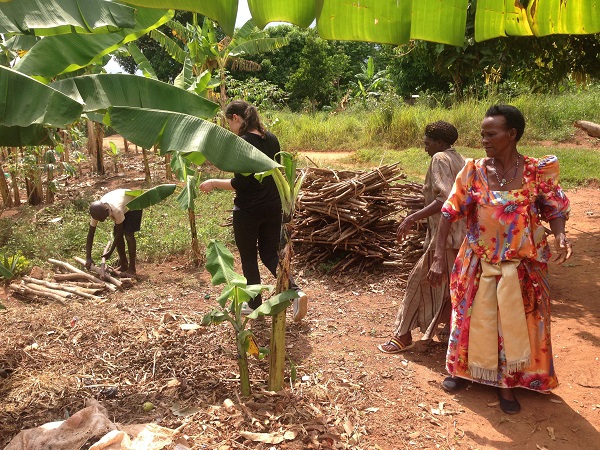

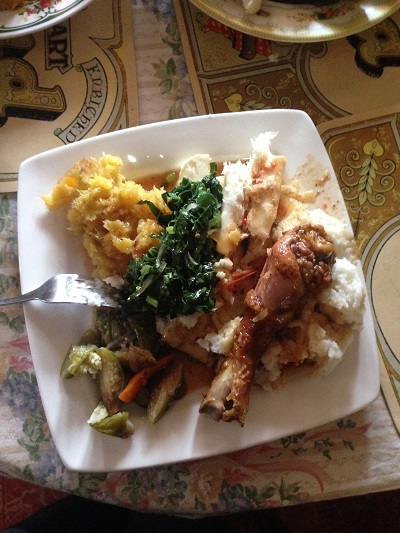

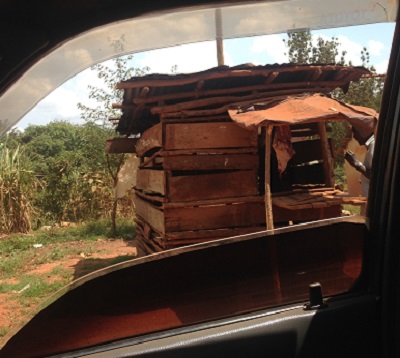

Eating with our hands!
My family was kind enough to give me a fork, but they generally ate with their hands. They would use the starchy matoke to pick up other foods and eat them.
I’m left-handed so I always get a little nervous in these situations because I don’t know if using the left hand may have any sort of negative connotation.
Regardless, as with my Southern Africa trip as well, I always tried my best and if anything all the locals had a good laugh at me. Eating stews with one’s hands, almost like using chopsticks, is a skill the requires practice.
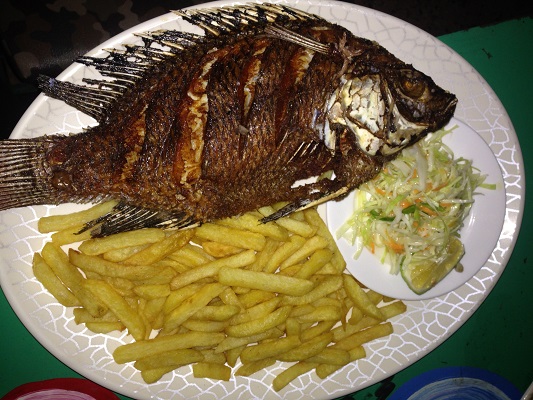

The test for eating with my hands: the Ugandan Restaurant
Ugandan restaurants often have similar items on the menu. You will generally see a selection of meats with French fries. I always opted for the fish since Lake Victoria was so close and it was fresh and delicious!
One restaurant right on Lake Victoria was really fun. I really recommend going and spending time by Lake Victoria, regardless.
But I have fun memories of the restaurant by Lake Victoria because, after the sun set, we had to eat in complete darkness. I had to also eat with my hands, which proves to be even more challenging if you can’t see anything!
Why darkness? It was because turning on a light there would have told every insect on the lake to COME ON OVER!
No restaurants or boats had lights on after a certain time. You could hear people in the darkness, but you never saw any lights.


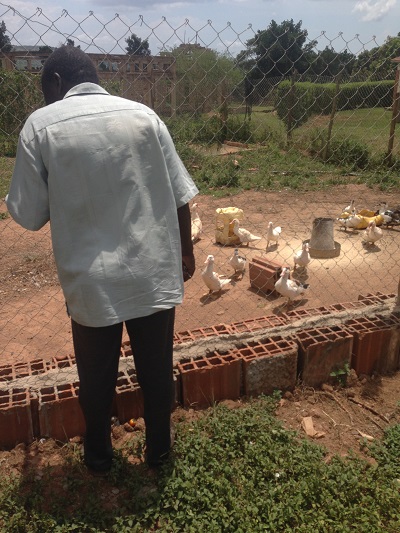

Who sits at the table? Cultural customs:
My hosts told me that typically the men of the family will sit at the table while the women sit on the ground. That is the Baganda tribe’s custom.
When they looked at the table and asked me where I would like to sit I just chose a seat. They sat me down and proceeded to all go into the other room and eat there, leaving me alone at the table.
I must have missed something…I laughed at myself and followed them.
In their home, the family enjoyed eating in front of their TV. The women would be on the ground and the father and brother sat on the couch. They insisted that I be on the couch, too.
The TV bit was interesting. I don’t know if it was just the family or if that is typical in households with a TV. It seemed like the social time for them was during the long cooking process. Eating wasn’t so social.
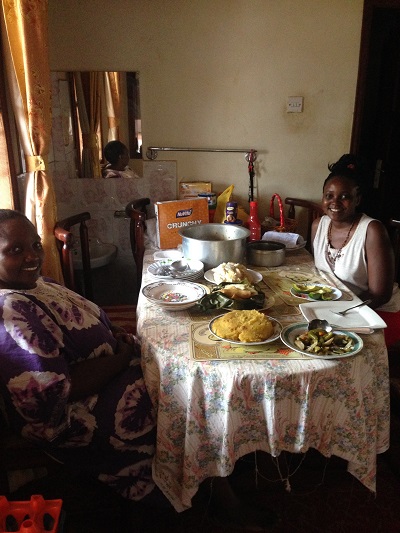

Alcohol in Uganda
At the restaurant, we all ate at the table together. We also enjoyed some beers. Even the women, younger and older, had some beer.
Well, by younger I mean in their mid 20s.
There was no alcohol in the home, and drinking was very light to moderate.
Eating and cooking Ugandan food with a local family was overall really humbling.
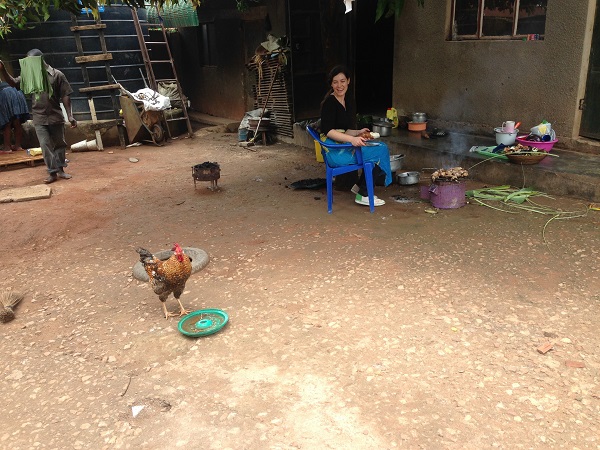

I am so thankful for my experience in Uganda!
Time and again, I stood out as a weirdo. Suddenly my ideas of etiquette and politeness were turned upside down, and I was being rude or silly in every way imaginable in this setting.
I needed their help to show me how to be respectful and learn!
Realizing that my own truths and assumptions are not set in stone once I step out of my own culture is probably one of the main reasons why I love to travel.
As always, I want to be sensitive when writing about cultures and I recognize that as a visitor they may have been behaving in a special way to accommodate me, so your experience in Uganda may be very different than my own! Regardless, go stuff your face.
If you liked this post, consider pinning it!
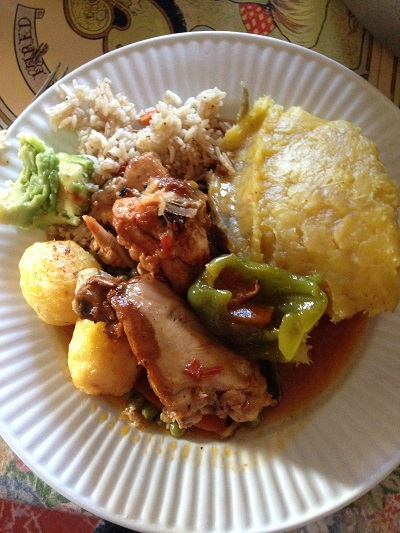
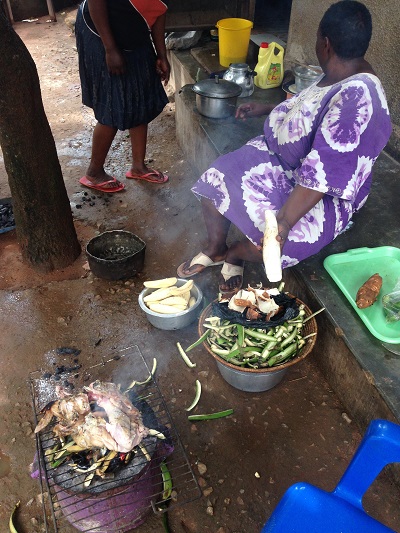
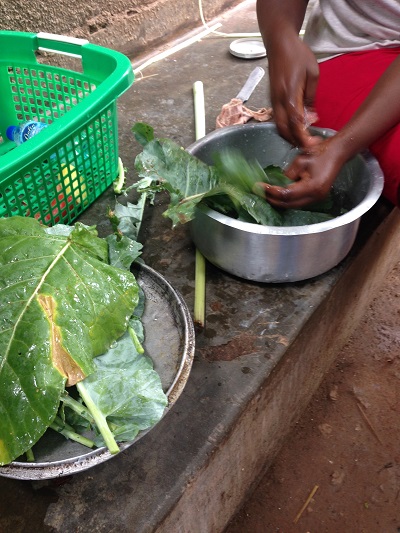
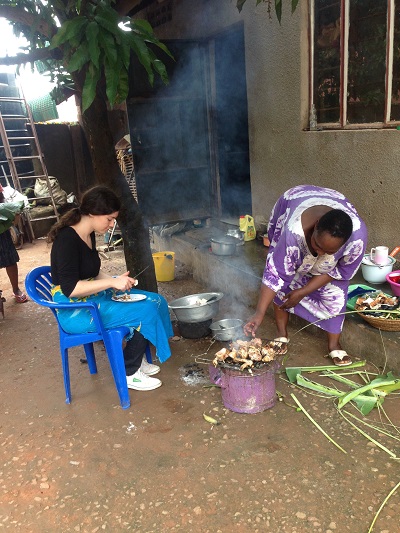
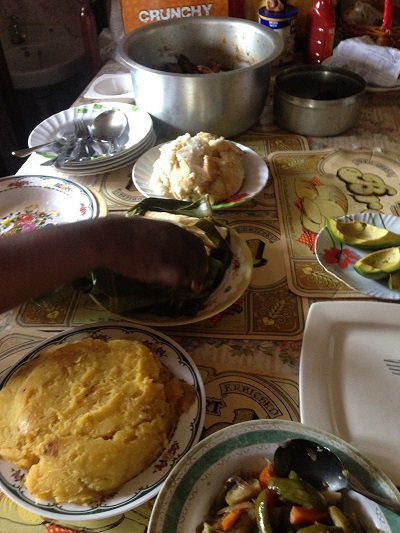
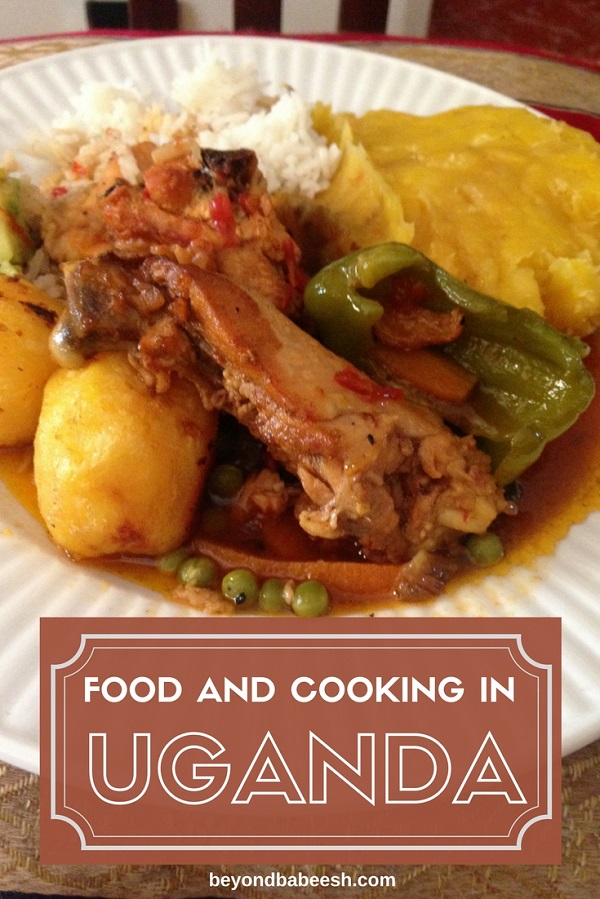



Leave a Reply